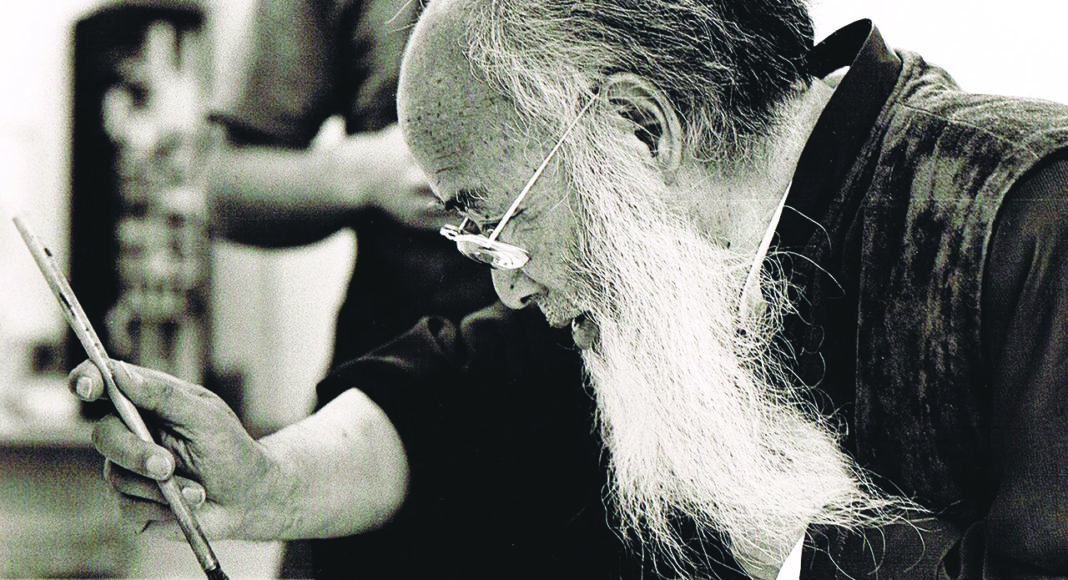Only at Cinequest can people jam the Hammer Theatre to watch an old bearded painter from China wander the world and dissolve every east-west divide 60 years ago.
On Sunday, March 17, the very final day of this year’s Cinequest, just such a thing might happen, when Weimin Zhang’s documentary, Of Color and Ink makes its only San Jose appearance.
Of Color and Ink unearths the journey of China’s most famous 20th century painter, Chang Dai-chien (1899-1983). Due to the Chinese political climate of 1949, Chang bailed from his home country and spent decades living in exile, setting up shop in Hong Kong, India, Argentina and the jungles of Brazil, where he even designed a huge garden on a 30-acre compound, before migrating yet again to Europe and the United States. He would never again return to his home country.
Mid-century, Chang became the first Chinese painter to achieve global stardom on the western museum circuit, via high-profile exhibits in Paris and Germany, before coming to San Francisco at the height of the hippie era and then Taiwan near the end of his life. The stereotypical “old bearded sage from the east,” the “Picasso of China,” Chang’s entire career was notoriously shrouded in mystery.
Years ago, director Weimin Zhang came to the story almost by chance. While teaching at San Francisco State University, she discovered a stack of long-forgotten 16mm films. The 1967 footage documented a Chang Dai-chien retrospective in San Francisco and featured the artist wandering along the California coast and painting in his Carmel studio. The films had been totally forgotten.
The director then became obsessed with Chang Dai-chien and commenced a 12-year quest that took her to nearly 20 countries and regions around the globe to trace the painter’s life. Of Color and Ink is the result.
“It seems that my destiny and Chang Dai-chien’s had crossed paths in different times but in the same space, unexpectedly,” says Zhang, in the film. “Perhaps it is chance, perhaps it is meant to be.”
The voice of Zhang, narrates the project, taking us through her journey. We also get historical footage of Chang the painter wandering around with a pet gibbon. He arrives in Europe, in the ’60s, wearing Song Dynasty robes to teach calligraphy classes. He meets Picasso, an encounter that exploded in the European press as a landmark “meeting of East and West.” In Brazil, he builds his “Garden of Eight Virtues.” With his long beard, glasses and walking stick, he goes down in history as an old sage, seemingly always longing for his native homeland, while retaining a life of complete mystery.
Several remarkable interviews appear in the film. In addition to art scholars, historians and old neighbors in multiple countries, Chang Dai-chien’s children speak of his original journey leaving Hong Kong via ship, a trip that took 50 days, going through Singapore and South Africa before arriving in Argentina. The family settled in the town of Mendoza at the foot of the Andes, where they were the only Asian family in the whole city.
Chang’s first solo show in Argentina was in 1952. At the time, there was no such phenomenon as an exiled Chinese painter who would set up shop in Latin America. He also wrote poetry that he sent back to his brother, who was exiled in Taiwan.
As the director, Zhang then arrives in Mendoza, in modern times, to search out the house where Chang Dai-chien lived half a century earlier. Unfortunately, his talents were not valued in ’50s Argentina, so he was forced to relocate yet again.
“His footsteps overseas seem like scattered pearls nearly impossible to trace,” says Zhang, in trying to piece together the painter’s life. The more she searches, the more she discovers, with each new discovery leading to more excitement but also more confusion. A sense of destiny drives her forward. “I hope to string together these lost pearls to reconstruct the true, and complete journey of this artist’s odyssey overseas,” he says.
Toward the end of his life, Chang Dai-chien referred to himself as “a man of the East, West, North and South,” since he had lived in Asia, South America, Europe and California.
I can’t think of a better title.
Hammer Theatre Center
101 Paseo de San Antonio, San Jose
Sunday, March 17, 12:10pm
$14



